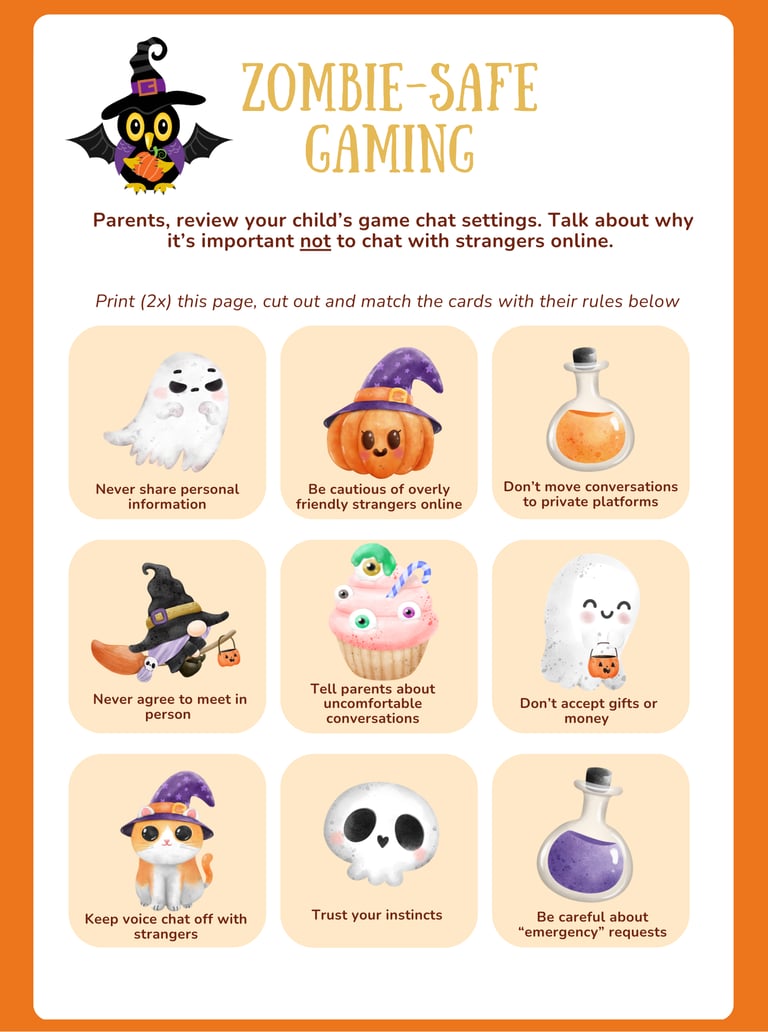Day 8 of the Spooky Cyber Safety Challenge
10 days of fun and safety for families, today's topic: Online Chats
Kae David
10/10/20252 min read


Day 8 of the Spooky Cyber Safety Challenge: Zombie-Safe Gaming
We’re creeping into Day 8 of 10 in our Spooky Cyber Safety Challenge! Today’s challenge is about keeping your kids safe while gaming online with our Zombie-Safe Gaming activity.
For many kids, online gaming is where they spend the most time with friends—and sometimes strangers. While games can be fun and social, the chat features often expose children to risks such as inappropriate conversations, phishing scams, or strangers trying to move conversations to unsafe platforms.
That’s why today’s activity is designed to help families talk about safe gaming habits and practice the rules together in a fun, hands-on way.
Why Zombie-Safe Gaming Matters
Predators target game chats because kids are more likely to let their guard down while playing.
Scams are disguised as gifts, rewards, or “emergencies” to trick children into sharing information.
Voice and text chats can normalize stranger interactions if not carefully monitored.
By creating family rules and practicing them, kids learn to recognize unsafe behavior and respond with confidence.
Examples of Zombie-Safe Gaming Rules
Here are the nine rules from today’s activity, explained with examples so you can talk through them with your child:
Never share personal information
No names, addresses, schools, or birthdays in chat. Even saying “I’m in 5th grade” gives away too much.
Be cautious of overly friendly strangers online
If someone suddenly acts like your best friend after meeting in a game, that’s a red flag.
Don’t move conversations to private platforms
Scammers may ask kids to move from game chat to texting or apps like Discord or WhatsApp. Keep conversations in the game where parents can monitor.
Never agree to meet in person
Meeting an online gaming friend in real life is never safe, no matter how nice they seem.
Tell parents about uncomfortable conversations
Encourage kids to immediately share if someone asks strange questions, uses bad language, or pressures them.
Don’t accept gifts or money
Free “skins,” “coins,” or “rewards” often come with a catch—like giving away personal details.
Keep voice chat off with strangers
Voice chat can reveal age, location, or other personal details. Keep it disabled unless it’s with real-life friends.
Trust your instincts
Teach kids to listen to their gut—if something feels weird, it probably is.
Be careful about “emergency” requests
Scammers may claim they need help urgently to trick kids into giving money or information.
Activity: Zombie-Safe Gaming Card Match
Print today’s Zombie-Safe Gaming sheet (print 2 copies).
Cut out the cards and play a matching game with your kids.
As you match the picture to the rule, talk about what each rule means and give examples.
This makes online safety both memorable and fun.


Cybersecurity Parents LLC
Empowering families to navigate the digital world.
Email us
© Cybersecurity Parents LLC 2025. All rights reserved.


All content, materials, and sessions provided by Cybersecurity Parents LLC are intended for informational and educational purposes only.
They do not constitute legal, financial, or cybersecurity advice. Parents, educators, and participants should use their own judgment and, when necessary, consult with a qualified professional. By participating in our events, reading our materials, or using our resources, you acknowledge and agree that Cybersecurity Parents LLC is not liable for any actions you take or outcomes resulting from the use or misuse of our content.
